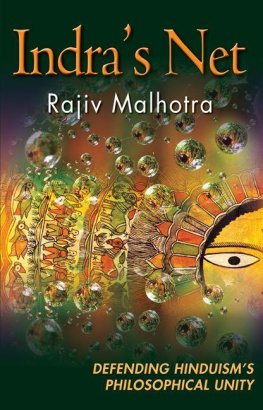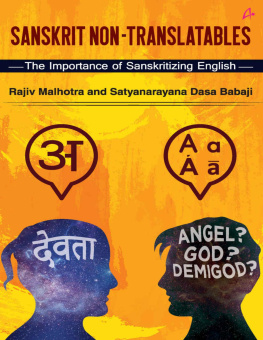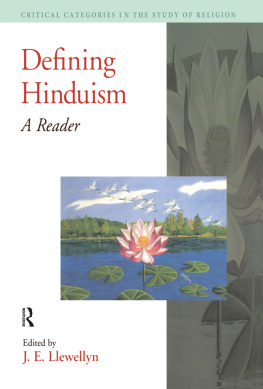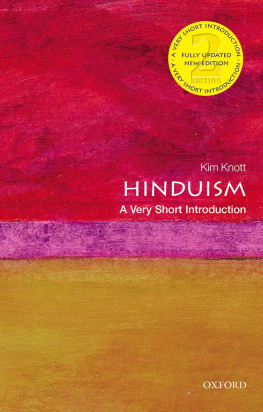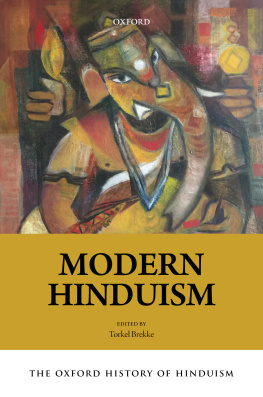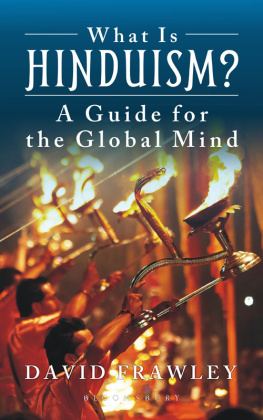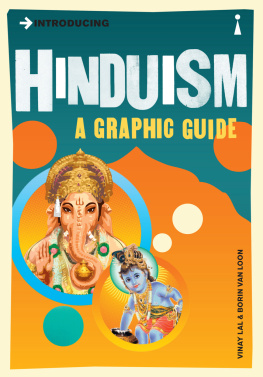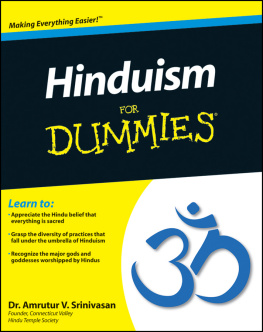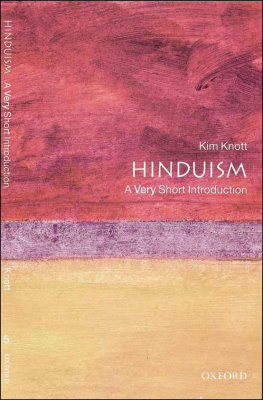Indras Net
DEFENDING HINDUISMS
PHILOSOPHICAL UNITY
Rajiv Malhotra

HarperCollins Publishers India
To my mother,
who raised me with the experience of Hinduism

Contents
P ART 1 PURVA PAKSHA
(Examination of My Opponents Positions)
P ART 2 UTTARA PAKSHA
(My Response)

Preface:
Why this book
E ach of my books tries to provoke a new kind of conversation, the goal of which is to confront some specific prejudice against Indian civilization. Established biases covering a wide range of issues need to be exposed, especially when they are unsubstantiated. The objective of every book of mine is to pick a particular dominant narrative which is sustained by a nexus of scholars specializing in that theme, and then target it to effectively subvert it. The success of any such book may be measured in terms of how much challenge it generates against the incumbent positions. If my counter-discourse can become established in the minds of a sufficient number of serious thinkers, then it will assume a life of its own and its effects will continue to snowball without my direct involvement. This is the end result I seek. To be effective, a book must resist straying from its strategic priorities and must avoid arguing too broadly.
For example, I developed the strategy, overall thesis, and much of the content of Invading the Sacred so as to take aim at the Freudian
My subsequent book, Breaking India, focused on demonstrating how external forces are trying to destabilize India by deliberately undermining its civilization. Such efforts are targeted at confusing and ultimately aborting any collective positive identity based on Indian civilization. The book exposed the foreign interests and their Indian sepoys who see Hinduism as a random juxtaposition of incoherent and fragmented traditions. Many watchdog movements have sprung into action because of that book. It has triggered a domino effect with other researchers now exposing more instances of the same syndrome.
My most recent book, Being Different, presents a coherent and original view of dharma as a family of traditions that challenges the Wests claim of universalism. Because Western universalism is unfortunately being used as the template for mapping and defining all cultures, it is important to become conscious of its distorted interpretation of Indian traditions. Being Different is prompting many Indians to question various simplistic views concerning their traditions, including some that are commonly espoused by their own gurus and political leaders. It is a handbook for serious intellectuals on how to take back Hinduism by understanding it on its own terms.
The present book exposes the influential narrative that Hinduism was fabricated during British rule and became a dangerous new religion. The central thesis which I seek to topple asserts that Swami Vivekananda plagiarized Western secular and Christian ideas and then recast them in Sanskrit terminology to claim Indian origins for them. Besides critiquing this nexus and defending Vivekanandas vision, this book also presents my own vision for the future of Hinduism and its place in the world.
Hence, the book has two purposes: to defend the unity of Hinduism as we practise it today, and to offer my own ideas about how to advance Vivekanandas revolution to the next stage.
This volume introduces some new vocabulary. Readers will learn the metaphor of Indras Net as a poetic expression of deep Hindu insights which subsequently became incorporated as the most central principle of Buddhism. They will understand Vivekanandas system of tat tvam asi ethics as an innovative social theory premised on seva (service to others), but firmly grounded in Vedic thought. They will also become familiar with the neo-Hinduism camp, which is my name for the group of scholars who have developed the thesis aimed at undermining Vivekanandas innovations and de-legitimizing contemporary Hinduism.
The book introduces and explains such ideas as open architecture and toolbox, which are critical to my insights on Hinduism. While openness has always been characteristic of Hindus, too much of a good thing can be dangerous. I argue that this very quality of openness has made Hinduism susceptible to becoming digested. Digestion, a concept introduced in my earlier books, is further elaborated in these pages.
In the Conclusion, I stick my neck out and introduce a set of defensive strategies for safeguarding against digestion. I call these strategies the poison pill (borrowing from corporate jargon) and the porcupine defence. I hope this provocative proposition will trigger debate and controversy.
Some of the new vocabulary that was introduced in BeingDifferentsuch as history centrism, integral unity and embodied knowingwill be further sharpened in these pages. I will also ascribe new meanings to the old Sanskrit terms astika and nastika, and utilize them differently than in the tradition.
As an author, I am often asked who my target audience is. This is not an easy question to answer. Clearly, I wish to influence mainstream Hindus who are often seriously misinformed about their own traditions. But if I were simply dishing out what they want to hear, appealing to their feel-good sensibility, I would be doing them a disservice; I would also be failing in my goal to radically change the discourse. Bombastic books that present Hinduism in a chauvinistic manner are counter-productive and a recipe for disaster. My hope is to spur the genesis of what I call a home team of intellectual leaders who would research, reposition and articulate Hinduism in a responsible way on important issues today. Therefore, my writings must be rigorous to withstand the scrutiny of harsh critics.
This means I must also write for the secular establishment and the old guard of Hindu leaders, both of whom will be provoked by this book for different reasons. The secularists will attack it as a defence of Hinduism which to them is synonymous with communalism. The Hindus with tunnel vision will complain that it deviates from their narrow, fossilized lineage boundaries. While trying to educate the mainstream readers in the middle, I also wish to debate both these extremes.
Let me confess up-front that I have made some compromises for practical reasons. For instance, I use the term philosophy to refer not only to Western philosophy but also, at times, to Indian thought, even though the latter would more accurately be called darshana. In every book I like to introduce a small number of non-translatable Sanskrit terms which I attempt to explain deeper than merely providing a reductive English equivalent. This book contains several such non-translatables, but darshana is not one of them. I use the word philosophy even where darshana would perhaps be more appropriate. I apologize for this pragmatic simplification because I do not wish to overload my reader.
The difference between philosophy and darshana is significant. Philosophy resides in the analytic realm, is entirely dis-embodied, and is an intellectual tool driven by the ego. Darshana includes philosophy but goes much further because it also includes embodied experience. Traditionally, Indian thought has been characterized by the interplay of intellectual analysis and sadhana (spiritual practice), with no barriers between the two. Hindu practices cultivate certain states of mind as preparation for receiving advanced knowledge. In other words, darshana includes
Next page
